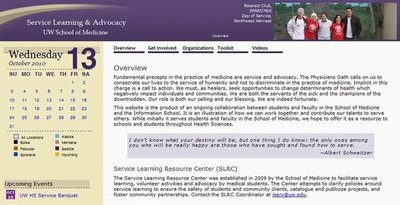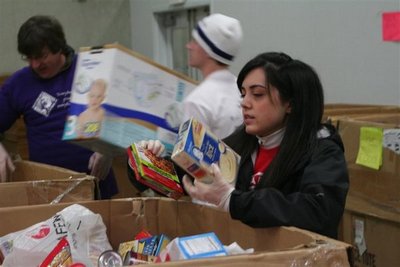October 14, 2010
Service Learning Resource Center launches website created by Information School students
The problem: Plenty of UW Health Sciences students were willing to volunteer for service learning projects and plenty of projects needed their help, but there was no central clearinghouse, no place where the two groups could connect.
A solution: The Service Learning Resource Center — and now, a website that connects students with projects that need their help. Find it here. (Access to the site requires a UW Net ID.)
Information School graduate and undergraduate students built the site in four academic quarters. Integrating events, students, organizations, faculty advisers and community partners proved trickier than anticipated. “Yes, it looks simple now, but every relationship in the database was complicated,” said D.A. Clements, the Information School lecturer in charge of site construction.
The center got going in 2009 when as part of reaccrediting the School of Medicine, the Liaison Committee on Medical Education required more service learning opportunities, more outreach to underserved communities in the five-state region the school serves. Laura Ellis coordinates the center as part of her job in School of Medicine Academic Affairs.
The website offers ways to get involved and contact information for 39 volunteer groups. The groups include the UW Community Health Advancement Program, or CHAP, which works in medically underserved communities.
Ian Maki is the program manager for CHAP and SPARX (Student Providers Aspiring to Rural and Underserved Experience), a UW group that encourages health science students to practice in medically underserved rural and urban areas. He said that this past year, 591 students in those two groups have participated in volunteer projects.
The Service Learning website offers a range of opportunities, including clinics, education, fundraising and advocacy for underserved groups. The best opportunities, said Maki, are the ones that combine education with service.
UW students said volunteering becomes a way to relieve self-absorption, to forget a constant need to shine in the presence of evaluators. The students also found it instructive for their own work. Maegan Marie Ashworth, who is working on a medical degree and a doctorate in epidemiology, said that talking with people at outreach clinics helped her understand where medical research data comes from and the rapport researchers must establish with their subjects.
Ashworth is one of seven Health Sciences people whose videotaped stories about service experiences are posted at the new website.
The site also includes a tool kit for service learning projects, showing how to locate a community partner, assess needs, plan the project, raise money, schedule the work and evaluate it afterward.
- The first annual UW Health Science Service Banquet will be held at 5:30 p.m. Friday, Oct.15, at the Vista Cafe in the Foege Genome Science Building. Health Sciences graduate students, faculty and staff are invited to attend; no RSVP necessary.


